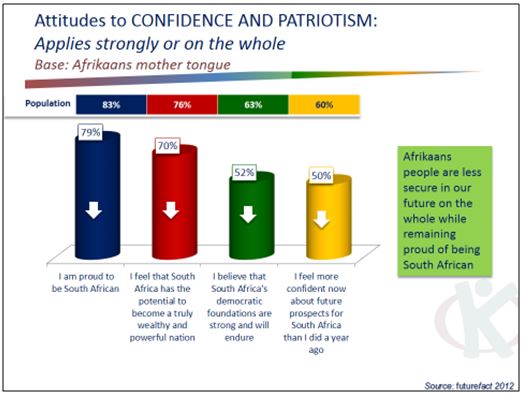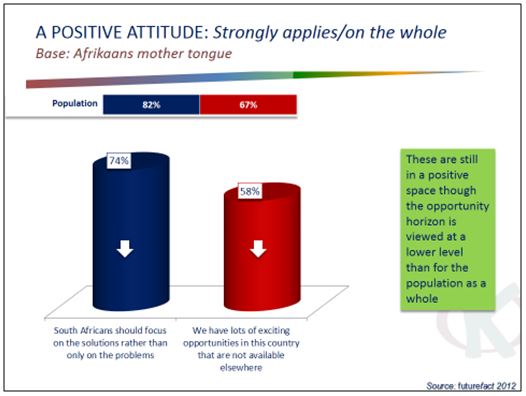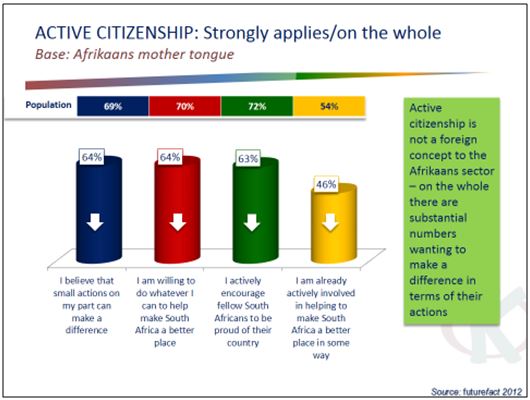The minds and moods of the Afrikaans market
What are the sentiments of the Afrikaans market? JOS KUPER provides valuable insights gleaned from in-depth research.
Contrary to the belief in some quarters and even in what is reflected in the media, the Afrikaans sector is not a pessimistic, disillusioned population that has no home in the ‘new' South Africa. In keeping with the majority of the population, first-language Afrikaans speakers describe themselves first and foremost as South Africans rather than the other options like African, or by language, race, cultural group or religion. When asked for their second descriptor, race is more likely to be selected than language, albeit at a very low level.
This data is from futurefact, which has been surveying the attitudes and beliefs of South Africans since 1998. the findings presented here are from 2012 and are based on a probability sample of 2 946 adults aged 15 and over, living in communities of more than 500 people throughout south Africa and representing 21.6 million adults.
The findings make it clear that among Afrikaners, there is a palpable pride in being South African and a sense of belonging. In fact, they rate their commitment to the country at 7.7 out of a possible 10 points, not significantly below that of the general population as a whole at 8.3.
They do tend to be somewhat more critical of the government and are concerned about the country's future trajectory. As a general rule, they would certainly like the government to be more accountable.
Previously, the Afrikaans market was above average in expressing a loss of hope that corruption can be brought under control, but now the general population is starting to show similar levels of hopelessness. The Afrikaans market remains less confident that crime levels can be contained. Approximately 15% of this community claim they or a family member have been a victim of some kind of crime or scam. This is at similar levels to the population as a whole.
With perhaps the exception of the Afrikaans farmers who have trekked to Perth, the above concerns don't generally translate into a desire to leave for the Afrikaans-speaking sector as a whole. In fact there is an acknowledgement that their quality of life in this country is better than it would be elsewhere.
There is also a positive mindset within the Afrikaans community and a belief that we should focus on solutions rather than only on the problems. There is also a desire to capitalise on the opportunities that they see existing in the country, while obviously wanting remedies for the ills. This mindset has media ramifications - doom and gloom content is not likely to resonate with the sector as a whole, particularly with the younger generation who are even more positive. But this does not imply sunshine journalism: they certainly want to know the realities, albeit with a better balance.
It is misleading to conceptualise and pigeon-hole Afrikaans speakers as a stereotypical, homogenous and insulated sector. They are undoubtedly an intrinsic part of the whole and view themselves in this context. In so doing, they don't diminish the value they place on their traditions and language.
There has been greater inter-generational mobility among the Afrikaans-speaking coloured community than white Afrikaans speakers, particularly into the middle class. There are now proportionately as many Afrikaans-speaking coloureds as whites who fall into the middle class, though there are still far more coloureds than whites in the working class. The white Afrikaans inter-generational mobility has been substantial into the upper middle and upper classes.
Adoption of the digital world is far lower for coloured Afrikaans speakers with some growth year-on-year. In the Afrikaans coloured community, 18% have access to the internet, compared to 47% of the white Afrikaans sector.
There are many differences in outlook on life and identity when comparing the coloured and white Afrikaans speaking communities. Generally, there are low levels of a common identity of ‘Afrikaans-ness'. Members of the coloured community particularly do not feel that they have much in common culturally, socially, and politically. This becomes even stronger among their youth who increasingly want to identify with English as a language. This is being encouraged by their parents. White Afrikaans-speaking parents are the only language group who would choose that their children be educated in their home language rather than in English.
While language is often a key consideration in choice of media, the bigger consideration is whether the medium reflects the issues, the interests and the values of the market. Afrikaans on its own does not automatically ensure consumption without the above considerations.
As with all sectors of the population, this poses a challenge for media. there needs to be a balance between reflecting a global culture pertinent to the younger sector that is middle class and above, while simultaneously reflecting the traditional values that define people's roots and cultural interests (for example, religious views, music genres and family/community activities).
It is also true that over time, the digital world is likely to exert more of an influence and impact on media consumption - and it will be critical to secure the market's loyalty to a medium via relevant content, whatever the platform.
Jos Kuper is a research professional with more than 40 year's experience. She heads Kuper Research, a consultancy specialising in media, marketing and socio-political analysis. www.futurefact.co.za
This article first appeared in The Media magazine's June 2013 issue.
Click here to sign up to receive our free daily headline email newsletter




